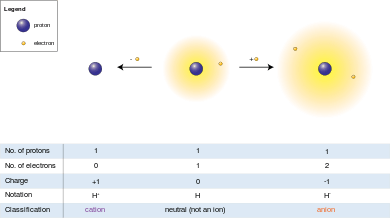Hydrogen ion
Hydrogen ion is recommended by IUPAC as a general term for all ions of hydrogen and its isotopes.[1] Depending on the charge of the ion, two different classes can be distinguished: positively charged ions and negatively charged ions.
Cation (positively charged)

When hydrogen loses its electron, the following cations can be formed:
- Hydron: general name referring to the positive ion of any hydrogen isotope (H+)
- Proton: 1H+ (i.e. the cation of protium)
- Deuteron: 2H+, D+
- Triton: 3H+, T+
In addition, the ions produced by the reaction of these cations with water as well as their hydrates are called hydrogen ions:
- Hydronium ion: H3O+
- Zundel cation: H5O2+ (named for Georg Zundel)
- Eigen cation: H9O4+ (named for Manfred Eigen)
Zundel cations and Eigen cations play an important role in proton diffusion according to the Grotthuss mechanism.
In connection with acids, "hydrogen ions" typically refers to hydrons.

Hydrogen atom (center) contains a single proton and a single electron. Removal of the electron gives a cation (left), whereas addition of an electron gives an anion (right). The hydrogen anion, with its loosely held two-electron cloud, has a larger radius than the neutral atom, which in turn is much larger than the bare proton of the cation. Hydrogen forms the only cation that has no electrons, but even cations that (unlike hydrogen) still retain one or more electrons are still smaller than the neutral atoms or molecules from which they are derived.
Anion (negatively charged)
Hydrogen anions are formed when additional electrons are acquired:
- Hydride: general name referring to the negative ion of any hydrogen isotope (H−)
- Protide: 1H−
- Deuteride: 2H−, D −
- Tritide: 3H−, T −